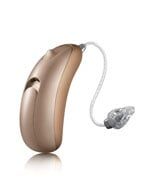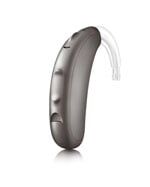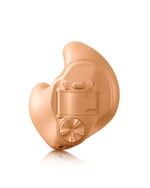316 US Route One - Unit B, York, ME 03909 | 545 Main Street Waterboro, ME 04087 | hearingessentials1@gmail.com
Hearing Aids
Hearing Aids 101
Wide Variety of Digital Hearing Aids
Digital hearing aids are the most advanced form of hearing aid technology on the market. Digital hearing aids give the user control over sound quality and sound processing characteristics. Please see the different types of hearing aids we offer below. If you have any questions, don't hesitate to call us in York at 207-703-0415 or Waterboro
207-247-6328
RIC BTE (Receiver in Canal - Behind-the-Ear)
The receiver in canal behind-the-ear hearing aids features an open fitting that does not require an earmold but instead uses a live speaker that fits in the ear canal. RIC fittings are lightweight, small, more comfortable for the user, and will fit a broader range of hearing losses. Because of the versatile range of the domes, there is less moisture build-up and allows for a more comfortable fit.


BTE (Behind-the-Ear)
Behind-the-ear hearing aids are a more conventional option that people perceive about hearing aids, but because of the power and circuit settings that are available, sometimes it is necessary. A BTE hearing aid sits on the back of your ear with custom-made earmolds wrapping around to fit comfortably in your ear. For individuals with dexterity issues but not severe hearing loss, BTE hearing aids are now available with a slimmer, more comfortable option that includes an invisible slender tube instead of the current thicker plastic tubing.
ITE (In-the-Ear)
In-the-ear hearing aids are more prominent, easier to handle, and adjust volume or programs than most of the smaller custom-made hearing aids. Another benefit is the size of the hearing aid will allow for a larger battery which will last longer and is easier to insert and remove.


ITC (In-the-Canal)
In-the-canal hearing aids are slightly less visible than ITEs. They require more dexterity to control the volume wheels and other controls on the faceplate.
CIC (Completely-in-Canal)
Completely-in-the-canal hearing aids are small, discreet and cosmetically-appealing. They are custom made to fit deeper in your ear canal and require a removal string to pull the small device out. Because of their size, CICs can only fit mild to moderate hearing losses, they are not available with manual controls but can use a remote device to change volume or programs. Due to their size, the battery is much smaller and can be more difficult to handle.
IIC (Invisible-in-Canal)
Invisible-in-the-canal hearing aids fit deep in the ear and are virtually invisible and use a removal string to remove it. The fitting range is mild to mild-moderate and is an excellent aid for a first-time wearer that needs some help but is not ready for the more robust aids.
The Truth about Hearing Aids
How Hearing Aids Work
Hearing aids are made up of small microphones used collect sounds, a computer chip that converts incoming sound. The computer chip can analyze sound and adjust the volume based on your hearing loss. Depending on the severity of your hearing loss and the environments you function in will determine the level of technology you will need.
Hearing Evaluation
The first step one of our highly-trained Hearing Professionals will ask you questions regarding the onset of your hearing loss, creating a case history. Next a look into the ear canal to check for obstructions or visible irritations, once it is determined there are no issues the actual hearing test will begin.
Upon completion of the hearing test, your answers will help our hearing experts determine if a referral to a medical doctor is necessary for further examination and possible treatment. If the testing reveals no medical issues, a hearing aid may be advised for one or both ears.
Choosing the Right Hearing Aid for You
Hearing Essentials offers hearing aids from all manufacturers so that they can find the right aid for your needs. Our expert staff will use the information provided in the case history and the evaluation to help you pick the best hearing aid for your lifestyle. Our hearing expert can fit, adjust and program your hearing aids, to ensure you get the best hearing available.
Hearing Aid Fitting
During the hearing aid fitting, the device will be programmed to meet the needs of the wearer. The new wearer is provided with instructions that explain how to insert and remove your hearing aids, change batteries, and clean the device. This is also the time that the professional reiterates the function of the hearing aid as it relates to the individual's lifestyle.
Getting Used to Hearing Aids
It could take several days to adjust to your new hearing aids. For most people, it takes a few weeks, but some individuals require several months to adjust. A good rule of thumb is when you have had a significant amount of hearing loss, presenting for an extended period, the longer the transition can be to the use of hearing aids. No two individuals adapt the same when it comes to hearing aids, so don't be alarmed if the adjustment does not happen immediately. The best advice is BE POSITIVE. The more positive you are, the faster you adapt to the changes.
Realistic Expectations
Hearing aids work exceptionally well when they are fitted and adjusted appropriately. All hearing aids should be comfortable concerning the level of sound and physical fit. If any discomfort is present, you should return to your hearing professional to have your hearing aids adjusted. Hearing aids can drastically improve hearing, but will not provide perfect hearing.
Background Noise
Whether you are a hearing aid user or a non-hearing aid user, you will experience background noise at one time or another. Hearing aids cannot eliminate sounds that you do not want to hear, but there are now hearing aids that can amplify sounds you want to hear and depreciate some unwanted sounds. Your hearing professional can recommend hearing aids that can minimize unwanted sounds and find the best circuits and microphone settings for your hearing loss, benefiting your communication needs.

Starkey Hearing Technologies

Widex

PHONAK

sivantos

unitron

SONIC
Questions to Ask Before You Buy
Do I Need One Hearing Aid or Two?
If you only have hearing loss in one ear, then it will be recommended that you need one hearing aid. If you have hearing loss in both ears, you will most likely need to wear one hearing aid in each ear because it will improve your ability to hear in noisy settings. Two hearing aids will also allow you to localize sounds in your environment, so you can tell which directions the sounds are coming from, giving it a fuller quality.
How Much Should I Pay for a Hearing Aid?
Features and function determine the cost, and these factors can help you decide whether to spend the money on hearing aids. The more features you want and higher level of performance you'd like, the more you'll pay. If you live a simple life, rarely venture out, and don't believe in the heavy use of technology or electronic devices, then it does not make sense to shell out money for expensive hearing aids.
If you live by yourself and are concerned about being able to hear noises in your home for safety or you want to watch your daily soap opera, you may want to consider a higher quality hearing aid. Top-of-the-line hearing aids can make talking on the phone or socializing with friends and family an easy feat and not a frustrating burden.
If you live by yourself and are concerned about being able to hear noises in your home for safety or you want to watch your daily soap opera, you may want to consider a higher quality hearing aid. Top-of-the-line hearing aids can make talking on the phone or socializing with friends and family an easy feat and not a frustrating burden.
What Kind of Warranty is Included with My Hearing Aids?
Most hearing aids will come with a 30-day trial period, during this trial period is when you want to make sure the fit and technology is right for you. If your hearing aids are uncomfortable or you do not hear as well as you hoped, you are encouraged to have them readjusted by a healthcare professional. If you are not satisfied with the hearing aids, this gives you a chance to try something different that will work or, you can return them. Some companies may charge a return or fitting fee so make sure to ask before the trial.
Which Brands Are Best?
Hearing Essentials professionals go through rigorous training with manufacturers to ensure they are up to date with the newest technology and how the program them. We are continually testing the aids in the field to make sure they will stand up to the quality you are expecting. The brands we carry, we chose because of our experience working with their products. We believe these brands are the best hearing aids that will genuinely help you get more out of life.
Does Insurance Cover Hearing Aids?
Most health insurance companies will not cover hearing aids, but some do. You will need to check with your insurance provider to see whether your hearing aids will be covered. Some children and young adults ages 21 and under are eligible under Medicaid. Medicaid will cover the diagnosis and treatment of hearing loss, under the Early and Periodic Screening, Diagnostic, and Treatment (EPSDT) service, including hearing aids. If you have a policy with the State Children's Health Insurance Program (SCHIP), some children may be covered under the early intervention program.
Medicare will not cover hearing aids for adults, but diagnostic evaluations may be covered if they are ordered by the doctor to assist in developing a treatment plan. The bone anchored hearing aid (BAHA) is recognized by Medicare as a prosthetic device and not a hearing aid and may be covered if other coverage policies are met.
Medicare will not cover hearing aids for adults, but diagnostic evaluations may be covered if they are ordered by the doctor to assist in developing a treatment plan. The bone anchored hearing aid (BAHA) is recognized by Medicare as a prosthetic device and not a hearing aid and may be covered if other coverage policies are met.
Other Questions to Ask Your Hearing Professional:
- Can the hearing professional make adjustments and provide servicing and minor repairs?
- Do the benefits of newer technologies outweigh the higher costs?
- Does the warranty cover future maintenance and repairs?
- How do I know when to have my hearing tested?
- How long is the warranty?
- Is there a trial period to test the hearing aids? (Most manufacturers allow a 30-to 60-day trial period during which aids can be returned for a refund.)
- What features would be most useful to me?
- What fees are nonrefundable if the aids are returned after the trial period?
- What instruction does the hearing professional provide?
- What is the total cost of the hearing aid?
- What service do they provide after the sale?
- Will loaner aids be provided when repairs are needed?
CONTACT INFORMATION
Address: 316 US Route One - Unit B, York, ME 03909
Tel:
207-703-0415
Address: 545 Main Street Waterboro, ME 04087
Tel:
207-247-6328
Email:
hearingessentials1@gmail.com
HOURS OF OPERATION
Mon-Thu 9:00 AM - 5:00 PM
Friday 9:00 AM - 2:00 PM
Friday 9:00 AM - 2:00 PM
BROWSE OUR WEBSITE
CONTACT INFORMATION
Address: 316 US Route One - Unit B, York, ME 03909
Tel:
207-703-0415
Address: 545 Main Street Waterboro, ME 04087
Tel:
207-247-6328
Email:
hearingessentials1@gmail.com
HOURS OF OPERATION
Mon-Thu 9:00 AM - 5:00 PM
Friday 9:00 AM - 2:00 PM
Friday 9:00 AM - 2:00 PM
Content, including images, displayed on this website is protected by copyright laws. Downloading, republication, retransmission or reproduction of content on this website is strictly prohibited. Terms of Use
| Privacy Policy

